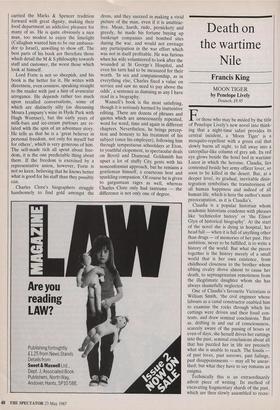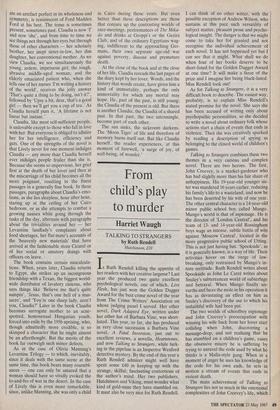Death on the wartime Nile
Francis King
MOON TIGER by Penelope Lively
Deutsch, £9.95
For those who may be misled by the title of Penelope Lively's new novel into think- ing that a night-time safari provides its central incident, a 'Moon Tiger' is a mosquito-repellent with a green coil that slowly burns all night, to fall away into a caterpillar-like column of grey ash. Its red eye glows beside the hotel bed in wartime Luxor in which the heroine, Claudia, lies contented beside her army officer lover, so soon to be killed in the desert. But, at a deeper level, its gradual, inevitable disin- tegration symbolises the transitoriness of all human happiness and indeed of all human life, which is here the author's main preoccupation, as it is Claudia's.
Claudia is a popular historian whom academic historians condemn with phrases like 'technicolor history' or 'the Elinor Glyn of historical biography'. At the start of the novel she is dying in hospital, her head full — when it is full of anything other than drugs — of memories of her past. Her ambition, never to be fulfilled, is to write a history of the world. But what she pieces together is the history merely of a small world that is her own existence, from childhood closeness to the brother whom sibling rivalry drove almost to cause her death, to septuagenarian remoteness from the illegitimate daughter whom she has always shamefully neglected.
One of Claudia's favourite Victorians is William Smith, 'the civil engineer whose labours as a canal constructor enabled him to examine the rocks through which his cuttings were driven and their fossil con- tents, and draw seminal conclusions.' But as, drifting in and out of consciousness, scarcely aware of the passing of hours or even of days, she herself drives her cuttings into the past, seminal conclusions about all that has puzzled her in life are precisely what she is unable to reach. The fossils of past loves, past sorrows, past failings, past disappointments — may all be unear- thed; but what they have to say remains an enigma.
Technically this is an extraordinarily adroit piece of writing. Its method of excavating fragmentary shards of the past, which are then slowly assembled to recre-
ate an artefact perfect in its wholeness and symmetry, is reminiscent of Ford Maddox Ford at his best, The tense is sometimes present, sometimes past. Claudia is now 'I' and now 'she', and from time to time we see things not through her eyes but through those of other characters — her scholarly brother, her inept sister-in-law, her dim daughter, her conventional mother. As we view Claudia, we see simultaneously the young, ardent, impetuous girl; the tough, abrasive middle-aged woman; and the elderly emaciated patient who, when she tells one of her nurses 'I'm writing a history of the world', receives the jolly answer `That's quite a thing to be doing, isn't it?', followed by `Upsy a bit, dear, that's a good girl — then we'll get you a cup of tea.' As Claudia herself puts it, 'A lifetime is not linear but instant.'
Claudia, like most self-sufficient people, is unlovable except to those who fall in love with her, But everyone is obliged to admire her for her intelligence, efficiency and guts. One of the strengths of the novel is that Lively never for one moment indulges Claudia — any more than Claudia herself ever indulges people frailer than she is. Because she seems so impervious, her grief first at the death of her lover and then at the miscarriage of his child becomes all the more poignant, resulting in the finest passages in a generally fine book. In these passages, paragraphs about Claudia's emo- tions, as she lies sleepless, hour after hour, staring up at the ceiling of her Cairo bedroom, or as she attempts to combat a growing nausea while going through the tasks of the day, alternate with paragraphs about the trivialities around her — her Levantine landlady's complaints about food shortages, her flat-mate's accounts of the 'heavenly new materials' that have arrived at the fashionable store Cicurel or of her social or amatory doings with officers on leave.
The book contains certain miscalcula- tions, When, years later, Claudia returns to Egypt, she strikes up an incongruous friendship with a Texan, the biggest world- wide distributor of lavatory cisterns, who says things like 'Believe me that's quite sumpin', 'Jesus, that's one hell of a mas- sacre', and 'You're one sharp lady, aren't you, Claudia?' Later in the book Claudia becomes surrogate mother to an acne- spotted, homosexual Hungarian youth, forced into exile by the 1956 uprising, who, though admittedly more credible, is so skimped a character that he might almost be an afterthought. But the merits of the book far outweigh such minor defects.
As in the case of Olivia Manning's Levantine Trilogy — to which, inevitably, since it deals with the same scene at the same time, this book bears many resembl- ances — one can only be amazed that a woman should have so vividly evoked the to-and-fro of war in the desert. In the case of Lively this is even more remarkable, since, unlike Manning, she was only a child in Cairo during those years. But even better than these descriptions are those that conjure up the contrasting worlds of race-meetings, performances of The Mika- do and drinks at Groppi's or the Gezira Club, and of the ordinary Egyptians wag- ing, indifferent to the approaching Ger- mans, their own separate age-old war against poverty, disease and premature death.
At the close of the book and at the close of her life, Claudia rereads the last pages of the diary kept by her lover. Words, and the history that words create, have given him a kind of immortality, perhaps the only immortality for which any mortal may hope. He, part of the past, is still young; the Claudia of the present is old. But there is another Claudia, the Claudia of a shared past. In that past, the two intermingle, become part of each other.
The sun sinks, the sickroom darkens. The 'Moon Tiger' of life and therefore of memory burns itself out. But like Claudia herself, the reader experiences, at this moment of farewell, 'a surge of joy, of well-being, of wonder.'










































































 Previous page
Previous page